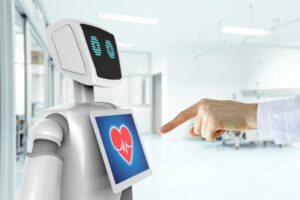

It enables different stakeholders to view or download reports for different regions and hospitals. MAGe also provides detailed analytics and segregates comments on the basis of positive and negative sentiment filters. It analyzes comments by visitors/ patients on different platforms like Facebook, Twitter, MouthShut, etc. Unlike the majority of patient-focused medical chatbots, MAGe caters to the requirements of internal stakeholders across a healthcare service provider company. Pros: Ada puts access in the hands of the users.Ĭons: Again, limited natural language understanding capabilities negatively impact the user experience. It then analyzes its findings against the information available in the medical library to craft a much more relevant and contextual response. Instead of banking only on a repository of information, Ada compares user queries with thousands of similar cases. This medical chatbot brings together doctors, scientists, and industry pioneers to improve the quality of personal healthcare. Hence, a lot more contextualization is required to cater to the needs of a global audience. Pros: Information provided by the chatbot is very interesting and contextual.Ĭons: Content has been curated keeping Indian audience in mind. The bot handles around 50,000 queries each month. Parents can interact with Nina on Google Assistant or the website. Parents can customize the meal plan to address specific nutritional requirements, find innovative recipes to make the fussy eaters happy, set reminders, and even keep a food journal. NINA helps young parents create a daily meal plan for their children. While the concept is good, its practical implications remain to be seen.īuilt using Senseforth’s Generative Conversational AI platform A.ware, NINA is one of India’s first AI-powered digital nutritionists. Pros: It is possible to build a unique brand persona using various characters with Sensely.Ĭons: We are still a long way from truly embodying empathy with AI. It is important to understand that Sensely is not a chatbot instead, it offers the platform and pre-built capabilities required to build different types of medical chatbots. From underwriting, claims handling, and symptom assessment to customer service, employee wellness, and clinical trials, it offers a wide range of capabilities. Sensely helps insurers, healthcare service providers, businesses, and pharma companies build custom solutions to bridge the gap between low fidelity chatbots and high-quality human communications. And best of all, it is available for free.Ĭons: Language understanding capabilities are limited in this chatbot, which negatively impacts the experience. Pros: The chatbot uses a vast repository of reliable healthcare information to offer relevant answers to all user queries. Available on the web and as a stand-alone app, it acts as a personal health assistant allowing users to check symptoms, ask a question, or take a health quiz. However, what stands apart from all the other features is its symptom checker. Get inspired by these 6 innovative medical chatbots:ĭesigned to help patients find the healthcare information they need to stay healthy, MD offers various features and functions. Poised to change the way payers, medical care providers, and patients interact with each other, medical chatbots are one of the most matured and influential AI-powered healthcare solutions developed so far. These bots can also play a critical role in making relevant healthcare information accessible to the right stakeholders, at the right time.įrom enhancing patient experience and helping medical professionals, to improving healthcare processes and unlocking actionable insights, medical or healthcare chatbots can be used for achieving various objectives. Medical chatbots are AI-powered conversational solutions that help patients, insurance companies, and healthcare providers easily connect with each other.

However, the majority of these AI solutions (focusing on operational performance and clinical outcomes) are still in their infancy. The market is brimming with technology vendors working on AI models and algorithms to enhance healthcare quality. Gartner predicts that nearly 75% of all global healthcare delivery organizations (HDOs) will have invested in an AI capability by 2021 ¹ We are witnessing a rapid upsurge in the development and implementation of various AI solutions in the healthcare sector. By harnessing the power of Generative Conversational AI, medical institutions are rewriting the rules of patient engagement. Emerging trends like increasing service demand, shifting focus towards 360-degree wellbeing, and rising costs of quality care are propelling the adoption of new technologies in the healthcare sector.


 0 kommentar(er)
0 kommentar(er)
